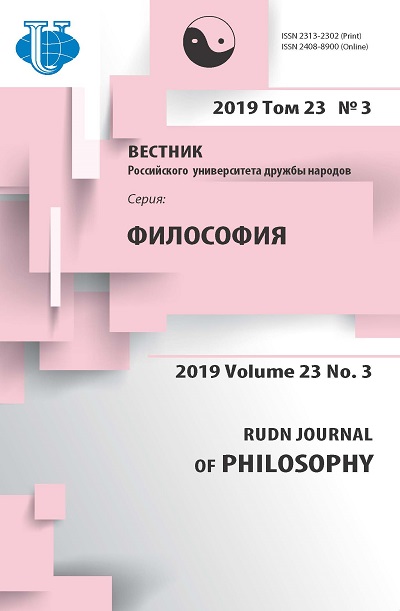ETERNAL VALUES: SIGNIFICANCE OF CREATIVITY OF A.S. PUSHKIN IN THE AGE OF SCIENTIFIC AND TECHNOLOGICAL PROGRESS (For the 220th Birth Anniversary)
- Authors: Moiseenko MV1
-
Affiliations:
- Peoples’ Friendship University of Russia (RUDN University)
- Issue: Vol 23, No 3 (2019)
- Pages: 356-362
- Section: SCIENTIFIC REPORTS
- URL: https://journals.rudn.ru/philosophy/article/view/21942
- DOI: https://doi.org/10.22363/2313-2302-2019-23-3-356-362
Cite item
Full Text
Abstract
The purpose of the article is to study the importance of Pushkin's work in the age of scientific and technological progress, to identify and analyze the moral values that accompany the work and personality of Alexander Pushkin and are particularly relevant to our time. The article discusses the moral values of honor and dignity, the ratio between good and evil, concepts of duty, justice, love and friendship, happiness, freedom, creativity, patriotism, national idea, peoples’ friendship and the problem of preserving Russian language in modern Russia. The article is written through the prism of interpretation of Pushkin’s creativity by Russian philosophers abroad and modern philosophers. The article deals with the problem of using neural networks that make it possible to reproduce the style of A. S. Pushkin. The author concludes about the relevance of the work of A. S. Pushkin in our days. The issues of preserving spirituality, moral values, national identity, and optimistic Renaissance perception of the world, of understanding the beauty of life, remain relevant and in demand in modern age of rapid scientific and technical progress, both in Russia and in the world.
About the authors
M V Moiseenko
Peoples’ Friendship University of Russia (RUDN University)
Author for correspondence.
Email: moiseenko-mv@rudn.ru
кандидат философских наук, доцент кафедры этики факультета гуманитарных и социальных наук
Moscow, RussiaReferences
- Ilyin IA. Alexander Pushkin as a guiding star of Russian culture. Collected works: In 10 volumes. V. 6. B. III. Мoscow, Russkaya kniga, 1997. P. 213 (In Russ.)
- Moiseenko MV, Tsvyk VA. Philosophical interpretation of the specifics of creativity of Pushkin A.S. 4 th International multidisciplinary scientific conference on Social Sciences & Arts SGEM 2017 conference. Proceedings BOOK 6 Sciences & Arts. Vol. II, 24—30 August, 2017 Albena Co. P. 573.
- Vysheslavcev BP. Pushkin's Liberty. (Individual freedom). O Rossii i russkoj filosofskoj kul'ture. Moscow, 1990. P. 400. (In Russ.).
- Maslin MA. Pushkin and Russian philosophy. (International conference proceedings. Part 1.) Pushkin A.S. i sovremennost'. K 200-letiju so dnja rozhdenija pojeta. Moscow, RUDN, 1999. P. 121. (In Russ.).
- Ilyin IA. Prophetic calling of Pushkin. Collected works: In 10 volumes. V. 6. B. II. Мoscow, Russkaya kniga, 1996. P. 43—55. (In Russ.).
- Ilyin IA. About Russia. Three speeches. 1926—1933. Collected works: In 10 volumes. V. 6. B. II. Мoscow, Russkaya kniga, 1996. P. 33 (In Russ.).
- Berdjaev NA. Russian idea. The main problems of Russian thought of the XIX century and the beginning of XX century. O Rossii i russkoj filosofskoj kul'ture. Moscow, 1990. P. 63. (In Russ.).
- Nikolaev PA. Pushkin in the modern public consciousness. (International conference proceedings. Part 1.) Pushkin A.S. i sovremennost'. K 200-letiju so dnja rozhdenija pojeta. Moscow, RUDN, 1999. P. 205. (In Russ.).
- Neuropoetry. How and why computers write poetry. Available from: https://iq.hse.ru/news/ 228812683.html. Accessed: May, 20, 2019. (In Russ.).
















